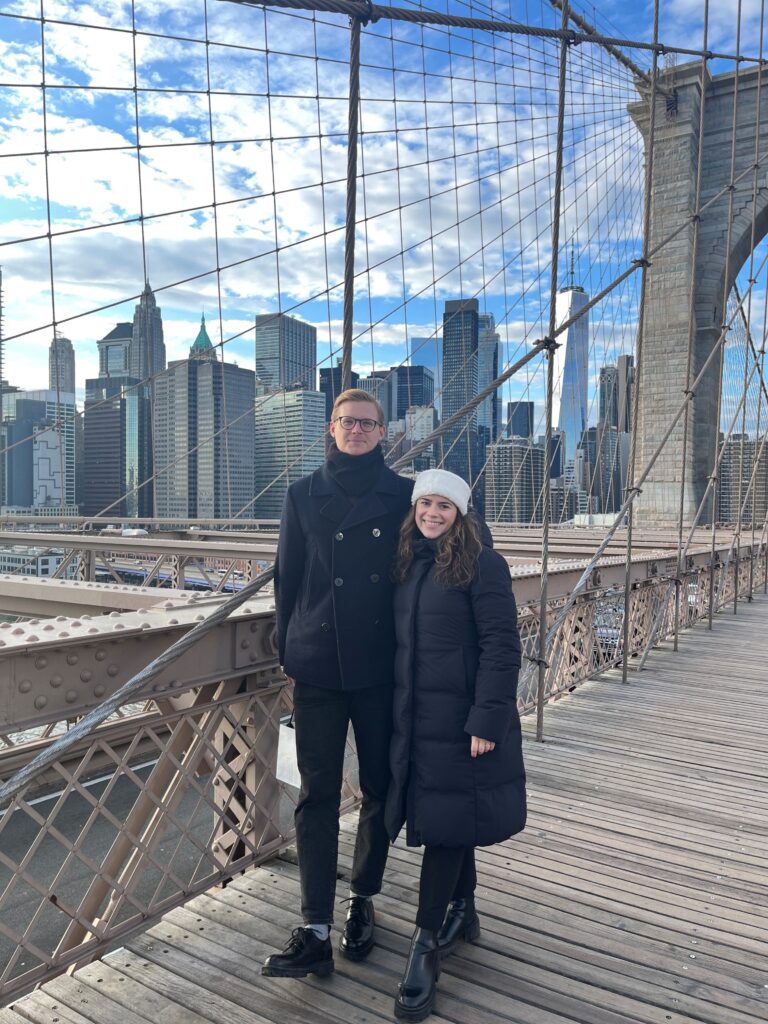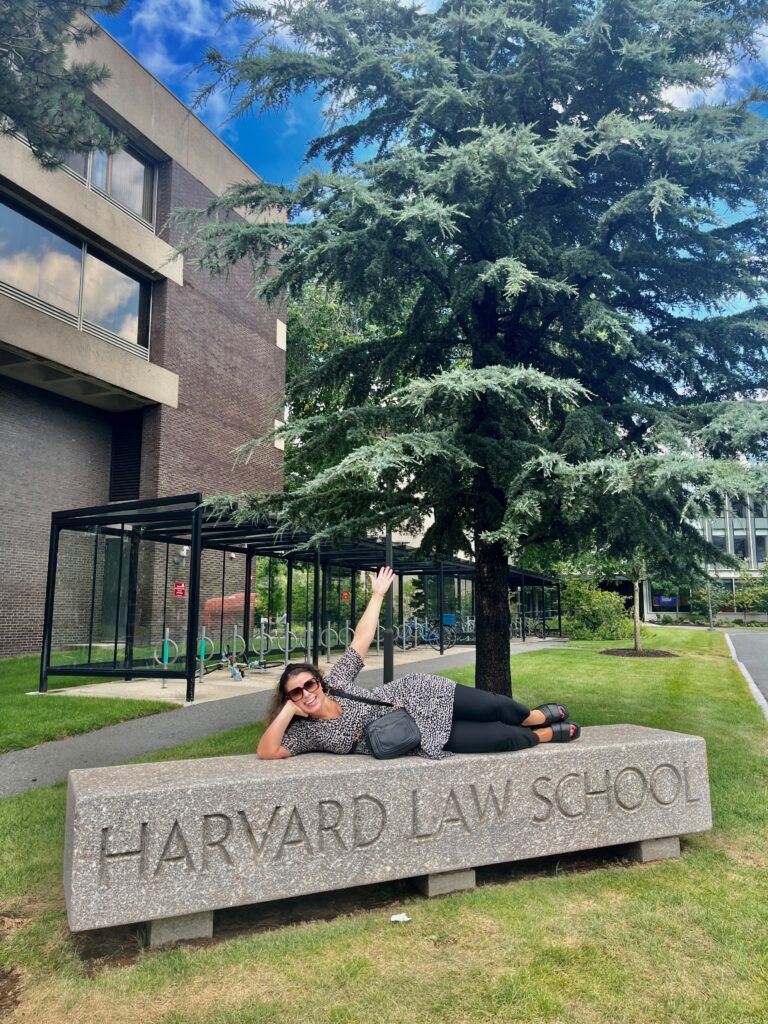Fulbright Is Not Just an Academic Experience, It’s Also a Cultural One

In 2023, Ivana Nikolic received a Fulbright grant to study law for an academic year at Harvard University. While at Harvard, Ivana served as Submissions Editor and Assistant Managing Editor at Harvard Human Rights Journal. She also contributed to the Harvard Journal of Law & Technology as Submissions Editor and was Co-President of the Harvard Human Rights and Business Student Association (HuB). In her spare time, she volunteered for the Harvard Prison Legal Assistance Project which represents incarcerated people in Massachusetts.
Prior to her time at Harvard, Ivana received her bachelor’s and master’s degrees in law from the University of Iceland, where she was recognized for having the highest grade point average ever given in a master’s degree since the Faculty of Law at the University of Iceland began awarding it. She also had the highest grade point average of her class for her bachelor’s degree in law. These achievements are all the more impressive given that Ivana is the second person in her family to get a university degree, and the first person in her family to complete a master’s degree.
Ivana received her LL.M. degree from Harvard in May, and shortly thereafter, she returned to Iceland. We caught up with her to chat about her Fulbright experience and life after her time abroad.
What have you been up to since your Fulbright ended?
I came home in May, and I started working at my old job as a legal advisor to the Parliamentary Ombudsman of Iceland. Then, I was offered an opportunity to work in the appeals court as a judicial law clerk, so I have been there since September. In the appeals court, I love that I get to work with a variety of cases and work with and learn from different judges. I have also been teaching at the University of Iceland, which I really enjoy. I teach administrative law and procedural law. At Harvard, most of my classes were interactive, and students were encouraged to be more engaged in discussion, which is something that I try to bring to my classroom.
What do you love about teaching?
I really like meeting with students and working with them. It feels like I am giving something back to my school, while at the same time growing the next generation of lawyers. I have a good bond with my students – they really trust me, and they come to me if they have a problem. Teaching keeps me sharp because when you teach something, you must really know it yourself. When I teach, I follow particular areas of law closely and educate myself by keeping up with new developments.
What drew you to the Fulbright program?
Before I even graduated from the University of Iceland, I knew that I wanted to study in the U.S. Many of my teachers were very good lawyers. I looked up to them, and when I researched them, I saw that they were Fulbright alumni. When I researched the Fulbright, I saw that it was a prestigious award that could help fund my studies in the U.S. In hindsight, I have to say that having the support from Fulbright made all the difference and was very important to me. Once I got the grant, everyone in the Fulbright Iceland office was so helpful. I could always ask questions, and I had so many questions about the visa process and moving to the U.S. Having supportive contacts at Fulbright Iceland was a big comfort to me because I knew that I could call them up anytime.
What was the Fulbright experience in the United States like for you?
I was very happy with my time in the U.S. It started off a little bit challenging because there was so much to learn. Not only was I adapting to American life, including small, everyday things like finding my grocery store, but I was doing all this away from my family and everything that I knew. However, after I found my own routine and support network, I loved every minute of it.
My Harvard cohort was about 180 people from 68 countries. I think it is Harvard’s objective to include as many diverse perspectives as possible; it’s also one of the main reasons that I chose this university. I mean, it is also a good school, of course, but one of my main goals for my time in the U.S. was to meet people from all over the world and have these amazing cultural experiences. There were 13 other students in my cohort who were on Fulbright grants. Being Fulbright grantees really connected us, and we supported one another and helped each other out, which was so great. I learned a lot in school, but it really surprised me how much I learned from my interactions and conversations with other people. I was there studying law and legal systems, so I did not expect the cultural elements to have such an impact on me, but I am glad that they did.
Now, I have friends all over the world, which is amazing to me. If I go to India, I have a few friends there. I have friends in South America and so many other places, and I am looking forward to nurturing these connections and meeting up with them in the future. My husband was also a Fulbright grantee at the same time, but he was studying at Duke. It was nice to visit him and see how different the U.S. can be across regions and universities.

You spent time at Columbia University in New York before your time at Harvard. How would you compare the two experiences?
I was in New York for about 6 weeks for a summer program, and it is an amazing city with so much to see. Personally, I preferred Cambridge for the longer experience because it is such a university city. There are so many colleges and students, so it is very lively. In New York, there is a lot to do, but the places and activities are so student-friendly in Cambridge. For the time that I was there, Cambridge was just a perfect fit. One of the things that struck me most about America was how friendly and warm people were to me wherever I went. In Iceland, people are friendly, but you really have to get to know them before they open up.
Overall, I found my American academic experience to be very different from my Icelandic law school experience. Most U.S. classrooms employ the Socratic Method of teaching, which encourages more dialogue between teachers and students, whereas, in many of my Icelandic classes there was less engagement, because courses were mostly lecture based. The Socratic Method has greatly influenced my teaching style.
What did you bring back to Iceland from your experience abroad?
Oh, so many things. I mean, besides the law that I learned, I would say that I developed cultural tolerance, but not just tolerance, understanding and appreciation of diverse cultures and different ways of thinking. You know, Iceland is a small country, so variances in opinions can also be very small. In the U.S. I learned to navigate spending time with people who have vastly different beliefs and opinions from my own. I also learned to be a better listener, and I am happy about that. My English also improved in all areas – reading, speaking, and writing. And as I mentioned before, my international network of friends and peers is invaluable because I feel like I will be connected to them for many years to come. I also now have American colleagues willing to serve as a resource as I grow in my field and vice versa.
In your Fulbright statement, you wrote a bit about your personal identity, particularly how even though you were born and raised in Iceland, being a child of Serbian immigrants and looking different from your peers gave you this desire to want to fit in. Did being away give you any new perspective on your identity?
My identity informed who I am today. Growing up, I always felt the need to prove myself. Often, I felt I had to do double the work just to get the recognition that other people would get normally. I think being away alleviated some of that need to prove myself. I realized that my life is more than that. I have proven myself, and that has been tiring in so many ways, so now my perspective is that we are all different, and we all bring something different to the table, and that is good. Being abroad taught me the value of difference and being at Harvard taught me that in a cohort of 180 people from all over the world, it is less about where you are from or what your parents do and it is more about what you are doing now and how you are improving the lives others.
Where do you see yourself in ten years?
Since coming back from the U.S., one of my big goals is to live more in the present. I worked so much through school, and getting to Harvard was a sort of validation of my hard work and planning, but I am challenging myself to appreciate the now. Having too many strict end goals can be restrictive, and that has been a very big lesson for me. I want to be more open to experiences and flexible. I do see myself still working for the government in some capacity, and I really want to keep going in the direction of human rights and constitutional law.
What advice would you give to other people who are considering Fulbright or experiences abroad?
I would say, go for it! Take your chances and try to do your best. Know that it is a competitive process, so start early and be prepared. Read over your application a million times and get others to read it too. The application is a lot of work, but in the end, Fulbright is such a worthwhile experience.





